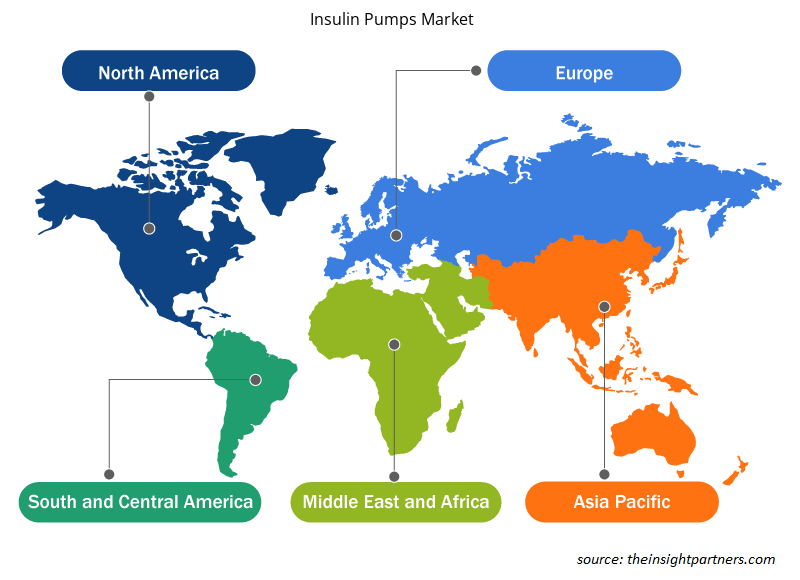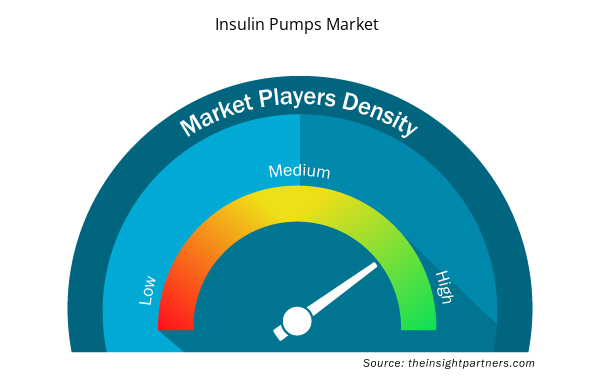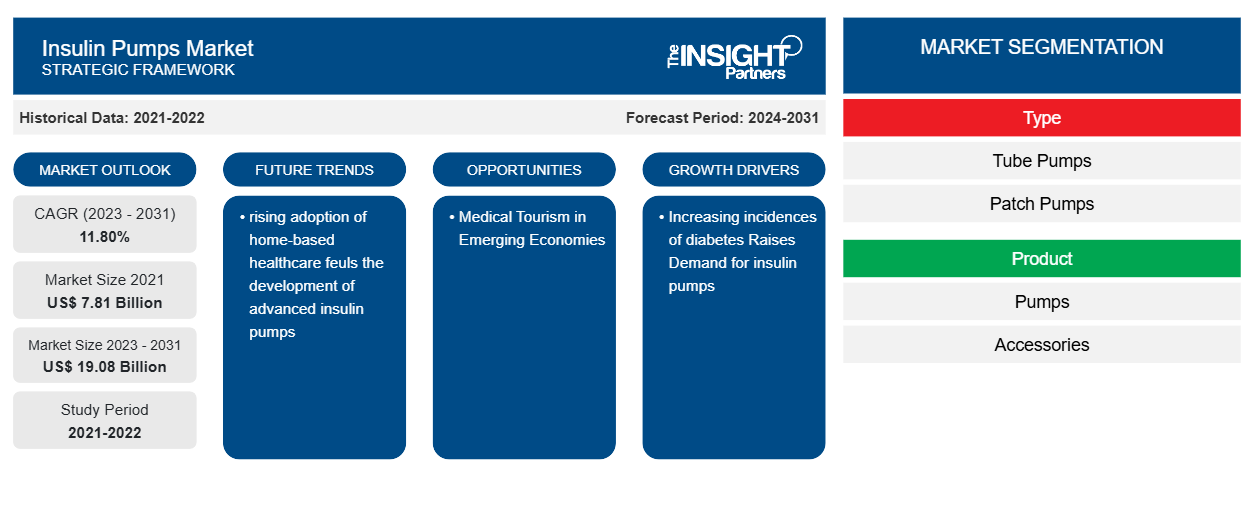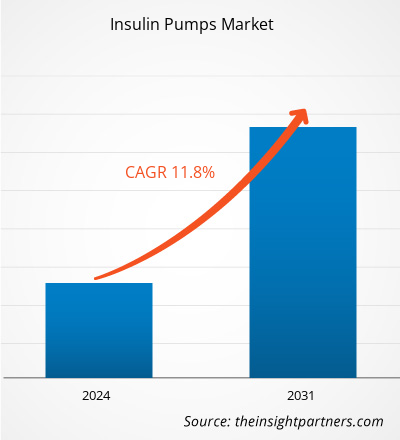2021 年胰岛素泵市场价值为 78.1 亿美元,预计到 2031 年将达到 190.8 亿美元。预计 2023-2031 年市场复合年增长率为 11.80%。技术进步可能仍是胰岛素泵市场的主要趋势。
胰岛素泵市场分析
胰岛素泵输送胰岛素,胰岛素是一种有助于降低糖尿病患者血糖水平的激素。胰岛素疗法是 1 型和 2 型糖尿病患者的基本治疗方法。糖尿病是重大健康问题之一,其患病率正在迅速上升。因此,需要尽早诊断和管理该疾病,以避免心脏病等进一步的问题。糖尿病发病率和患病率的上升以及相关风险因素(包括生活方式的改变、肥胖和人口老龄化)推动了市场对胰岛素泵的需求。
胰岛素泵市场概况
技术创新和智能解决方案继续对胰岛素泵市场产生重大影响。
亚太地区是胰岛素泵增长最快的区域市场。该地区的市场分为中国、日本、韩国、印度、澳大利亚和亚太地区其他地区。全球糖尿病患病率的不断上升、生活方式相关疾病发病率的上升以及人口老龄化预计将在未来几年推动市场增长。胰岛素泵适用于糖尿病患者,因为它们模仿正常胰腺的功能,在血糖水平高于正常范围时输送基础胰岛素剂量和推注剂量。预计在预测期内,患病率的不断上升将对市场增长产生重大影响。此外,强大的产品线组合和胰岛素泵未来的商业化预计将为该市场提供未来的增长机会。
定制此报告以满足您的需求
您可以免费定制任何报告,包括本报告的部分内容、国家级分析、Excel 数据包,以及为初创企业和大学提供优惠和折扣
- 获取此报告的关键市场趋势。这个免费样品将包括数据分析,从市场趋势到估计和预测。
胰岛素泵市场驱动因素和机遇
糖尿病患病率不断上升利好市场
根据美国糖尿病协会 2024 年发布的报告,2021 年有 3840 万美国人患有糖尿病。其中,2970 万人被确诊,870 万人未确诊。此外,国际糖尿病联合会 2022 年发布的报告显示,2021 年北美和加勒比地区糖尿病患者人数为 5100 万,欧洲为 6100 万,中东和北非为 7300 万,非洲为 2400 万,东南亚为 9000 万,西太平洋为 2.06 亿,南美洲和中美洲为 3200 万。
因此,糖尿病患病率的不断上升和输送设备技术的不断进步推动了胰岛素泵的发展。
医疗旅游增长——机遇
发展中国家医疗保健技术的进步吸引着患者前往国外接受更好、更划算的治疗,也吸引着主要参与者扩大业务。由于糖尿病患病率上升,设备使用率上升,大多数胰岛素泵制造商将重点放在印度、巴西、阿根廷和拉丁美洲国家等新兴市场。在印度,医学科学在过去几十年中蓬勃发展。糖尿病治疗在新兴市场既划算又容易获得,其他国家的人们也纷纷前往国外接受治疗。最可能的原因可能是他们国家的医疗费用过高。由于现有的汇率和其他因素,与其他国家相比,印度的糖尿病治疗费用已经变得可以承受。因此,预计在预测期内,印度等新兴国家的医疗旅游业将为胰岛素泵市场的参与者提供重大机遇。
胰岛素泵市场报告细分分析
促成胰岛素泵市场分析的关键部分包括类型、
产品和应用。
- 根据类型,胰岛素泵市场分为管泵和贴片泵。一次性产品在 2023 年可能会占据更大的市场份额。
- 根据产品,胰岛素泵市场分为泵和配件两部分。泵部分可能在 2023 年占据更大的市场份额。
- 根据应用,胰岛素泵市场分为 I 型糖尿病和 II 型糖尿病。1 型糖尿病细分市场可能在 2023 年占据更大的市场份额。
胰岛素泵市场份额(按地区)分析
胰岛素泵市场报告的地理范围主要分为五个地区:北美、亚太、欧洲、中东和非洲、南美和中美。
北美占据了胰岛素泵市场的主导地位。美国占据了北美胰岛素泵市场的相当一部分份额。美国顶级医疗服务提供商的存在是推动市场增长的最重要因素之一。预计未来几年亚太地区的复合年增长率最高。
胰岛素泵市场区域洞察
Insight Partners 的分析师已详细解释了预测期内影响胰岛素泵市场的区域趋势和因素。本节还讨论了北美、欧洲、亚太地区、中东和非洲以及南美和中美洲的胰岛素泵市场细分和地理位置。

- 获取胰岛素泵市场的区域特定数据
胰岛素泵市场报告范围
| 报告属性 | 细节 |
|---|---|
| 2021 年市场规模 | 78.1亿美元 |
| 2031 年市场规模 | 190.8亿美元 |
| 全球复合年增长率(2023 - 2031) | 11.80% |
| 史料 | 2021-2022 |
| 预测期 | 2024-2031 |
| 涵盖的领域 | 按类型
|
| 覆盖地区和国家 | 北美
|
| 市场领导者和主要公司简介 |
|
胰岛素泵市场参与者密度:了解其对业务动态的影响
胰岛素泵市场正在快速增长,这得益于终端用户需求的不断增长,而这些需求又源于消费者偏好的不断变化、技术进步以及对产品优势的认识不断提高等因素。随着需求的增加,企业正在扩大其产品范围,进行创新以满足消费者的需求,并利用新兴趋势,从而进一步推动市场增长。
市场参与者密度是指在特定市场或行业内运营的企业或公司的分布情况。它表明在给定市场空间中,相对于其规模或总市场价值,有多少竞争对手(市场参与者)存在。
在胰岛素泵市场运营的主要公司有:
- 胰岛素公司
- 美敦力
- 串联糖尿病护理有限公司
- 德比奥泰克公司
- 赛诺威
- SOOIL 发展有限公司
免责声明:上面列出的公司没有按照任何特定顺序排列。

- 了解胰岛素泵市场的主要参与者概况
胰岛素泵市场新闻和最新发展
胰岛素泵市场通过收集一级和二级研究后的定性和定量数据进行评估,其中包括重要的公司出版物、协会数据和数据库。以下是胰岛素泵市场的发展和战略列表:
- 总部位于瑞士的 PharmaSens 为其“niia essential”胰岛素贴片泵系统申请了 FDA 批准。该公司还于 2023 年 11 月获得了该系统设计、开发、制造和分销的 ISO 13485 认证。该产品是一款基础-餐时贴片泵,采用流线型设计,结合了胰岛素笔的易用性和先进胰岛素泵的优势。它具有创新的 3ml 储液器,使其成为市场上最紧凑的贴片泵之一。胰岛素贴片泵系统还采用了自动针头插入机制和半可重复使用概念,以实现成本效益和可持续的产品设计。(来源:PharmaSens AG,新闻稿,2023 年)
- 美国食品药品管理局 (FDA) 批准了 Beta Bionics iLet ACE 泵和 iLet 剂量决策软件,供 6 岁及以上 1 型糖尿病患者使用。这两款设备与兼容的 FDA 批准的集成式连续血糖监测仪 (iCGM) 组成了一个名为 iLet Bionic Pancreas 的新系统。新的自动胰岛素给药 (AID) 系统使用算法来确定和命令胰岛素输送。(来源:美国 FDA,新闻公告,2023 年)
胰岛素泵市场报告覆盖范围和交付成果
“胰岛素泵市场规模和预测(2021-2031)”报告对市场进行了详细分析,涵盖以下领域:
- 范围内所有主要细分市场的全球、区域和国家层面的市场规模和预测
- 市场动态,如驱动因素、限制因素和关键机遇
- 未来的主要趋势
- 详细的 PEST/波特五力分析和 SWOT 分析
- 全球和区域市场分析涵盖关键市场趋势、主要参与者、法规和最新市场发展
- 行业格局和竞争分析,涵盖市场集中度、热点图分析、知名参与者和最新发展
- 详细的公司简介
- 历史分析(2 年)、基准年、预测(7 年)及复合年增长率
- PEST 和 SWOT 分析
- 市场规模价值/数量 - 全球、区域、国家
- 行业和竞争格局
- Excel 数据集



Report Coverage
Revenue forecast, Company Analysis, Industry landscape, Growth factors, and Trends

Segment Covered
This text is related
to segments covered.

Regional Scope
North America, Europe, Asia Pacific, Middle East & Africa, South & Central America

Country Scope
This text is related
to country scope.
常见问题
North America dominated the insulin pumps market in 2023.
Factors including increasing incidences of diabetes and rising adoption of home-based healthcare are driving the insulin pumps market growth.
Growing technological advancements in insulin pumps is a future trend in the market.
Insulet Corporation; Medtronic; Tandem Diabetes Care, Inc; Debiotech S.A.; CELLNOVO; SOOIL Developments Co., Ltd; Microport Scientific Corporation; Valeritas Inc.; F. Hoffmann-La Roche Ltd.; and Ypsomed AG are some leading players operating in the Insulin pumps market.
The insulin pumps market is estimated to reach US$ 19.08 billion by 2031.
The insulin pumps market is anticipated to grow at a CAGR of 1119.08 billion.80% during 2023-2031.
Trends and growth analysis reports related to Life Sciences : READ MORE..
The Insight Partners performs research in 4 major stages: Data Collection & Secondary Research, Primary Research, Data Analysis and Data Triangulation & Final Review.
- Data Collection and Secondary Research:
As a market research and consulting firm operating from a decade, we have published and advised several client across the globe. First step for any study will start with an assessment of currently available data and insights from existing reports. Further, historical and current market information is collected from Investor Presentations, Annual Reports, SEC Filings, etc., and other information related to company’s performance and market positioning are gathered from Paid Databases (Factiva, Hoovers, and Reuters) and various other publications available in public domain.
Several associations trade associates, technical forums, institutes, societies and organization are accessed to gain technical as well as market related insights through their publications such as research papers, blogs and press releases related to the studies are referred to get cues about the market. Further, white papers, journals, magazines, and other news articles published in last 3 years are scrutinized and analyzed to understand the current market trends.
- Primary Research:
The primarily interview analysis comprise of data obtained from industry participants interview and answers to survey questions gathered by in-house primary team.
For primary research, interviews are conducted with industry experts/CEOs/Marketing Managers/VPs/Subject Matter Experts from both demand and supply side to get a 360-degree view of the market. The primary team conducts several interviews based on the complexity of the markets to understand the various market trends and dynamics which makes research more credible and precise.
A typical research interview fulfils the following functions:
- Provides first-hand information on the market size, market trends, growth trends, competitive landscape, and outlook
- Validates and strengthens in-house secondary research findings
- Develops the analysis team’s expertise and market understanding
Primary research involves email interactions and telephone interviews for each market, category, segment, and sub-segment across geographies. The participants who typically take part in such a process include, but are not limited to:
- Industry participants: VPs, business development managers, market intelligence managers and national sales managers
- Outside experts: Valuation experts, research analysts and key opinion leaders specializing in the electronics and semiconductor industry.
Below is the breakup of our primary respondents by company, designation, and region:

Once we receive the confirmation from primary research sources or primary respondents, we finalize the base year market estimation and forecast the data as per the macroeconomic and microeconomic factors assessed during data collection.
- Data Analysis:
Once data is validated through both secondary as well as primary respondents, we finalize the market estimations by hypothesis formulation and factor analysis at regional and country level.
- Macro-Economic Factor Analysis:
We analyse macroeconomic indicators such the gross domestic product (GDP), increase in the demand for goods and services across industries, technological advancement, regional economic growth, governmental policies, the influence of COVID-19, PEST analysis, and other aspects. This analysis aids in setting benchmarks for various nations/regions and approximating market splits. Additionally, the general trend of the aforementioned components aid in determining the market's development possibilities.
- Country Level Data:
Various factors that are especially aligned to the country are taken into account to determine the market size for a certain area and country, including the presence of vendors, such as headquarters and offices, the country's GDP, demand patterns, and industry growth. To comprehend the market dynamics for the nation, a number of growth variables, inhibitors, application areas, and current market trends are researched. The aforementioned elements aid in determining the country's overall market's growth potential.
- Company Profile:
The “Table of Contents” is formulated by listing and analyzing more than 25 - 30 companies operating in the market ecosystem across geographies. However, we profile only 10 companies as a standard practice in our syndicate reports. These 10 companies comprise leading, emerging, and regional players. Nonetheless, our analysis is not restricted to the 10 listed companies, we also analyze other companies present in the market to develop a holistic view and understand the prevailing trends. The “Company Profiles” section in the report covers key facts, business description, products & services, financial information, SWOT analysis, and key developments. The financial information presented is extracted from the annual reports and official documents of the publicly listed companies. Upon collecting the information for the sections of respective companies, we verify them via various primary sources and then compile the data in respective company profiles. The company level information helps us in deriving the base number as well as in forecasting the market size.
- Developing Base Number:
Aggregation of sales statistics (2020-2022) and macro-economic factor, and other secondary and primary research insights are utilized to arrive at base number and related market shares for 2022. The data gaps are identified in this step and relevant market data is analyzed, collected from paid primary interviews or databases. On finalizing the base year market size, forecasts are developed on the basis of macro-economic, industry and market growth factors and company level analysis.
- Data Triangulation and Final Review:
The market findings and base year market size calculations are validated from supply as well as demand side. Demand side validations are based on macro-economic factor analysis and benchmarks for respective regions and countries. In case of supply side validations, revenues of major companies are estimated (in case not available) based on industry benchmark, approximate number of employees, product portfolio, and primary interviews revenues are gathered. Further revenue from target product/service segment is assessed to avoid overshooting of market statistics. In case of heavy deviations between supply and demand side values, all thes steps are repeated to achieve synchronization.
We follow an iterative model, wherein we share our research findings with Subject Matter Experts (SME’s) and Key Opinion Leaders (KOLs) until consensus view of the market is not formulated – this model negates any drastic deviation in the opinions of experts. Only validated and universally acceptable research findings are quoted in our reports.
We have important check points that we use to validate our research findings – which we call – data triangulation, where we validate the information, we generate from secondary sources with primary interviews and then we re-validate with our internal data bases and Subject matter experts. This comprehensive model enables us to deliver high quality, reliable data in shortest possible time.


 获取此报告的免费样本
获取此报告的免费样本